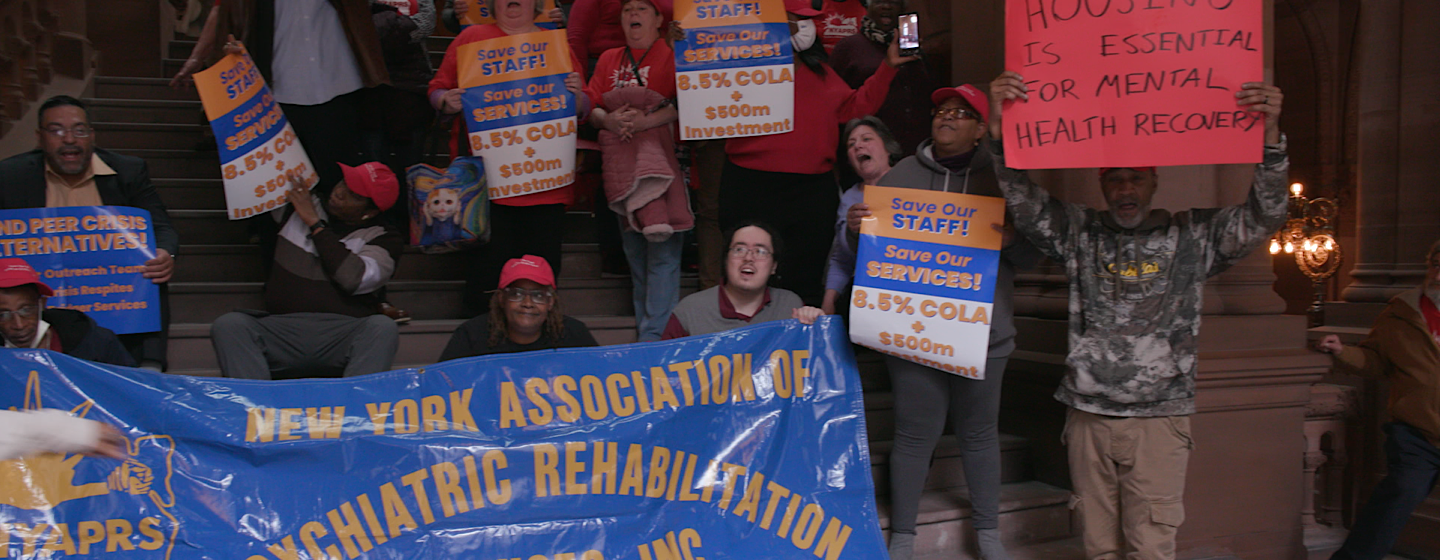Sen. Samra Brouk sponsors bill proposed to alleviate strain on mental health services

Sen. Samra Brouk sponsors bill proposed to alleviate strain on mental health services
With less than three weeks until New York’s deadline for a state budget, advocates were at the state capitol on Monday to push for the inclusion of an 8.5% cost of living adjustment for mental health workers who receive state funding and a $500 million investment for mental health services.
Advocates said that funding will help curb turnover among the mental health care industry’s workforce, and allow for a stronger investment in services.
It’s unclear if the full Legislature will be willing to approve the 8.5% cost of living adjustment, also called a COLA, but Senate Mental Health Chair Samra Broul, D-Monroe, said she’s on board.
“Right now across the state we have a workforce crisis but especially when it comes to mental healthcare, I’ve talked to facilities with 40% vacancy rates for their employees. What that means though is that when any of us need help there’s nobody there, if they’re unable to recruit and retain their staff,” Brouk said.
“So an 8.5% COLA, is again, the floor. That is just telling people, ‘hey you’ll be able to pay your mortgage next year by keeping this job.’”
There have been cost of living adjustments for human services but it's few and far between.
“Out of the last 17 years, we’ve only received three COLAs and the money that was lost due to those COLAs being not withstood equates to about $500 million,” said Luke Sikinyi, director of public policy for the New York Association of Psychiatric Rehabilitation Services.
"That's the short fall we are seeing because of the lack of investment over the last 15, 20 years.”
In addition to the $500 million dollar investment and the 8.5% COLA advocates are hoping to secure financial and political support for a number of programs that prioritize the choices and autonomy of individuals who are experiencing homelessness or in need of mental healthcare.
“For INSET we had the governor propose $2.8 million for three programs,” Sikinyi said.
Project INSET stands for Intensive and Sustained Engagement Team. The Mental Health Association of Westchester launched the project in May 2018. The INSET team is mobile and prioritizes meeting individuals where they are while offering peer and professional services.
The program is specifically designed for people with mental health conditions who’ve experienced multiple hospitalizations, incarcerations and substance abuse. The INSET approach is said to reduce hospitalizations by building and nurturing supportive networks so people under the team's care experience flexible wrap-around services in familiar environments.
“We really just want the legislature to approve that funding; it’s already been carved out by the governor and we know the program works extremely well and is great at engaging people,” Sikinyi said.
Clubhouses are community-based facilities for people with serious mental illnesses (SMI) whose lives have been affected by their SMI. The clubhouse model focuses on healing social symptoms of SMI – as well as physical and developmental symptoms – through a non-hierarchical system that acknowledges a member’s strengths and lets them choose how to build upon them.
Barry Floyd and Aracelis are members of clubhouses in the city. Aracelis said the Fountain House – opened in NYC during the 1940s – helped her continue her education through grants. Floyd said he was isolated before the clubhouse gave him opportunities to connect peers.
After membership, he started contributing to his clubhouse’s communications units. He’s even written a few articles for the unit.
“It’s a good feeling because it’s like you have a voice there,” Floyd said. “When we print the newspaper, that’s what goes out and you don’t feel shut out because the staff members do listen to us and they value our opinion.”
Sikiniyi says they’ve requested $2.5 million dollars each for the clubhouse and peer bridge programs.
“For the Peer Bridging and Clubhouses, we’re asking for, essentially, three pilots to show how well this works. We have done this in a number of hospitals before and we’ve seen a great success rate,” Sikinyi said.
During Governor Hochul’s 2023 State of the State, she proposed a 2.5% cost of living adjustment, a part of the $1 billion plan to support mental health care in New York State.
Related
Get an inside look at New York's state budget with a panel of experts including Josh Solomon from the Times Union and Rebecca Lewis from City & State NY. Discover the latest developments and potential impacts on the state's economy.
Explore More: https://nynow.wmht.org
A new '988' mental health crisis hotline is now active in New York. WCNY's David Lombardo speaks with Office of Mental Health Commissioner Dr. Ann Marie Sullivan.
Learn More: https://nynow.wmht.org/
One in five women will experience depression related to pregnancy, according to state data. Senate Mental Health Chair Samra Brouk joins us to discuss ways to address that problem.
Learn More: https://nynow.wmht.org/


